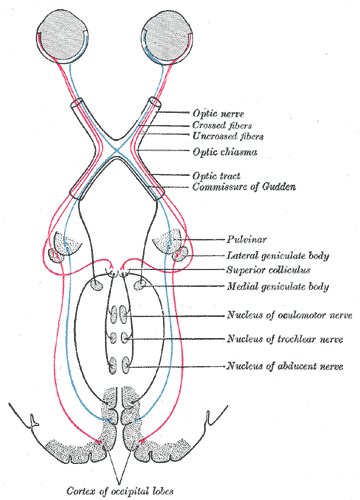Tectospinal Tract: Difference between revisions
Kim Jackson (talk | contribs) m (Removed rss feed) |
No edit summary |
||
| Line 26: | Line 26: | ||
- The Tectospinal tract receives information from the retina and cortical visual association areas <ref name="Rea">Rea P. Essential clinical anatomy of the nervous system. Academic Press; 2015 Jan 5.</ref>. In response to visual stimuli, the tectospinal tract mediates reflex movements<ref name="Crossman" />.It is able to orientate the head/trunk towards auditory stimulus (inferior colliculus) or visual stimuli (superior colliculus).<ref name="Fitzgerald" /> | - The Tectospinal tract receives information from the retina and cortical visual association areas <ref name="Rea">Rea P. Essential clinical anatomy of the nervous system. Academic Press; 2015 Jan 5.</ref>. In response to visual stimuli, the tectospinal tract mediates reflex movements<ref name="Crossman" />.It is able to orientate the head/trunk towards auditory stimulus (inferior colliculus) or visual stimuli (superior colliculus).<ref name="Fitzgerald" /> | ||
- During visual stimuli being sensed the neurons in the superior colliculus respond and cause the eye to saccade to the same part of the visual field. <ref name="Carpenter" /> | - During visual stimuli being sensed the [[Neurone|neurons]] in the superior colliculus respond and cause the eye to saccade to the same part of the visual field. <ref name="Carpenter" /> | ||
- Efferent fibres are thereby also sent to the reticular formation that trigger saccades and also spinal regions innervating the neck <ref name="Carpenter" />The connections with effector muscles are excitatory to contralateral neck muscle motor neurons and inhibitory to ipsilateral motor neurones.<ref name="Sengull">Sengul1 G, Watson C, Spinal Cord :Connections. In Mai JK, Paxinos G. The Human Nervous System. Third Edition. Academic Press, 2004</ref> | - Efferent fibres are thereby also sent to the reticular formation that trigger saccades and also spinal regions innervating the neck <ref name="Carpenter" />The connections with effector muscles are excitatory to contralateral neck muscle motor neurons and inhibitory to ipsilateral motor neurones.<ref name="Sengull">Sengul1 G, Watson C, Spinal Cord :Connections. In Mai JK, Paxinos G. The Human Nervous System. Third Edition. Academic Press, 2004</ref> | ||
Revision as of 11:48, 16 December 2020
Original Editor - Kate Sampson
Top Contributors - Kate Sampson, Lucinda hampton, WikiSysop and Kim Jackson
Description[edit | edit source]
The origin of the Tectospinal tract is in the superior colliculus of the midbrain. As this area recieves information regarding visual input, this tract is primarily responsible for mediating reflex responses to visual stimuli. [1] The tectospinal tract is named after the tectum, meaning roof. The tectum can be interpreted as the 'roof' of the fourth ventrical. The fourth ventricle is made up of the superior and inferior colliculi.[2]
Anatomy[edit | edit source]
Origin[edit | edit source]
- Superior colliculus of the midbrain (tectum of the midbrain).[1][3]
Course / Path[edit | edit source]
- Passes ventromedially around the periaqueductal grey matter. [1]
- Terminates in the medial part of the anterior gray horm of cervical and upper thoracic segments within laminae VI–VII. [1][3][4]
Function[edit | edit source]
- The Tectospinal tract receives information from the retina and cortical visual association areas [4]. In response to visual stimuli, the tectospinal tract mediates reflex movements[1].It is able to orientate the head/trunk towards auditory stimulus (inferior colliculus) or visual stimuli (superior colliculus).[3]
- During visual stimuli being sensed the neurons in the superior colliculus respond and cause the eye to saccade to the same part of the visual field. [2]
- Efferent fibres are thereby also sent to the reticular formation that trigger saccades and also spinal regions innervating the neck [2]The connections with effector muscles are excitatory to contralateral neck muscle motor neurons and inhibitory to ipsilateral motor neurones.[5]
References[edit | edit source]
- ↑ 1.0 1.1 1.2 1.3 1.4 Crossman AR, Neary D. Neuroanatomy: An Illustrated Colour Text. Third Edition. London: Elsevier, 2004
- ↑ 2.0 2.1 2.2 Carpenter R, Reddi B. Neurophysiology. A conceptual Approach. Fifth Edition. Hodder Arnold:London, 2012.
- ↑ 3.0 3.1 3.2 Fitzgerald MJT, Gruener G, Mtui E. Clinical neuroanatomy and neuroscience. Fifth Edition. Philadelphia: Elsevier Saunders, 2007
- ↑ 4.0 4.1 Rea P. Essential clinical anatomy of the nervous system. Academic Press; 2015 Jan 5.
- ↑ Sengul1 G, Watson C, Spinal Cord :Connections. In Mai JK, Paxinos G. The Human Nervous System. Third Edition. Academic Press, 2004
.







